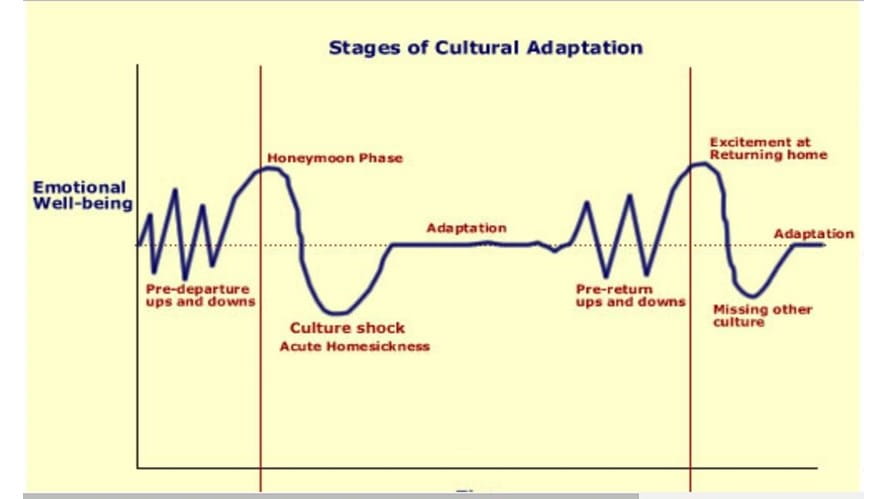Supporting Our Parent Community - Culture Shock Culture shock is defined by ‘Internations’ as the deeper cultural differences in mindset, customs and interpersonal interaction that trigger this phenomenon and turn cultural transition into a struggle. How does culture shock manifest itself? How should we deal with it?
As we start a new school year, we are reminded that for some transitioning to a new country and/or school can be a difficult experience and culture shock can play a big part for many. Please take the time to read this post that was written at this time last year by Ms Dee Grimshaw that will hopefully help support and guide our school community, particularly those new to Vietnam and/or BIS HCMC.
We have reached week 5 in our term and our campuses are once again alive with clubs, squad training, community visits and of course lessons. Across the campuses we are seeing smiling faces, excitement and challenge and children enjoying time with their friends.
At 7.45am particularly at our primary campuses, it is a hive of activity, parents and students fill the playgrounds to capacity, all waiting for our bell to ring and the day to begin. By 8.10 am the playground is cleared almost, as groups of parents depart for work or the gym, household chores and perhaps a coffee or breakfast with friends. Most leave smiling, chatting and excited possibly to have some child free time to themselves.
Others at this time of the year, leave on their own and appear less sure of themselves, sometimes looking back towards their children’s classes, a long day on their own looming in front of them. These are mostly our new parents but many existing parents are dotted amongst them and they are often dealing with what we call ‘culture shock’. At 5 weeks into term, possibly 2 to 3 months since new families arrived in Vietnam, it is the time when culture shock can hit and sometimes it hits with a bang.
What is culture shock?
Culture shock is defined by ‘Internations’ as the deeper cultural differences in mindset, customs and interpersonal interaction that trigger this phenomenon and turn cultural transition into a struggle. It can leave a feeling of disorientation when suddenly subjected to an unfamiliar culture, way of life, or set of attitudes. For many of us, we choose this path or journey but for others, because of spouses careers etc, it is forced upon us. Many of us believe we won’t have any problems, we’ll be able to deal with the changes and adapt easily to our new environment. However this is not always the case.
How does culture shock manifest itself?
It does so in a variety of different ways, lethargy, depression, anxiety and withdrawal. The most mundane of tasks become mountains to climb. For some, even getting out of bed in the morning can be a struggle. The excitement of moving to a new country, new foods, better weather, a new home can be replaced by anxiety and depression and feelings of despair. It is sometimes known as the ‘3 Month Dip’.

Not everyone will experience this dip and for some who do, it is a blip rather than a prolonged period of time. Recognising this dip and having strategies to cope with it is important, particularly for our parents who are also trying to support their own children through this period of transition.
Coping with culture shock
At school we support the children as best we can but we are also here to support parents that might be struggling. Our PTG (and in particular the country reps) is a wonderful way to meet others and find friends from your home country particularly if there is a language barrier. In the expatriate community, friends soon become as close as family and for those who are coming overseas for the first time, don’t be afraid to reach out to others and ask for help or tell people you are struggling. Everyone goes through it. It is not something that you should hide or feel that you have failed because you are struggling.
The first step is letting someone know. It might be a friend, it might be a teacher, it might be a member of the PTG. Please know that we are here and ready to support. If you are struggling, reach out.
Our Top Tips
In the meantime, some tips to help adjust and get through the ‘culture shock’ and on to the next stage which is ‘cultural adaptation’:
- Avoid comparisons between home and here or your previous posting and here.
- Try to learn some of the language, even if it’s just a few phrases. Making an effort with your host country can go a long way.
- Don’t be afraid to go beyond your comfort zone – be it phoning another parent for a coffee or joining a club or organisation.
- Try not to feel guilty – guilt for leaving family behind, guilty for feeling upset at being here or guilty for really enjoying your new life in our host country.
Some more reading/sites that may help;
http://www.transition-dynamics.com/principal.html
https://www.youtube.com/watch?v=eGM7eWYBJdI
http://definingmoves.com/
http://figt.org/
https://www.internations.org
Ms Dee Grimshaw, Deputy Headteacher at An Phu Primary Campus
2017 Update
If you missed Ms Dee Grimshaw's talk on Culture Shock this year then please click the link below to download the presentation slides.









